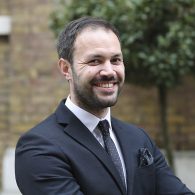PODCAST: Navigating tension: the keys to defining and developing thought leadership for knowledge intensive firms
February 10, 2021 • 3 minute read
Editor’s Note: The following podcast is part of an ongoing series offering insight into recent advances in thought leadership approaches, alongside strategic advice and expertise to help professional services stakeholders add value to their firms via proactive content campaigns.
Thought leadership. It’s a difficult term to define and one that generates significant debate. Is it just a buzzword, or does it connote something meaningful? For some the definition is bound up in the output that accompanies it – a white paper report for example or an opinionated article. For others it is dependent on the process – such as being rooted in original research.
At Infinite Global, we define thought leadership by the results it generates. Thought leadership, for us, is about changing the nature of a conversation or starting a new conversation altogether. That might be a one-to-one conversation with a business development prospect, or it might be a conversation within an industry or even global discourse about innovation, disruption, threats and opportunities. That is the mantra at the heart of Infinite Global Intelligence.
One person who is better qualified than most to talk about what thought leadership really is and what the challenges are for professional services firms (and individuals) seeking to become effective and credible thought leaders, is Will Harvey, Professor of Management and Associate Dean at the University of Exeter Business School.
Together with fellow academics Professor Vince-Wayne Mitchell from the Sydney Business School and Professor Eric Knight of Macquarie Business School, as well as Alessandra Almeida Jones, Director of Marketing at Baker McKenzie – the number one law firm brand according to Acritas – Will led a research project investigating the tensions of defining and developing thought leadership within knowledge intensive firms.
A paper presenting the research results was published by the Journal of Knowledge Management at the start of 2021 and is available to freely download via Emerald Insight.
Central to the research and Professor Harvey’s insight is the indentification of nine key tensions that developing thought leadership creates for professional service firms, and the professionals working within them.
Individual tensions
- How can individuals balance the risk of thought leadership with the safety of thought followership so they do not damage their reputation among salient stakeholders?
- How do individuals balance using the thought leadership derived from client engagement, with the restrictions of client confidentiality and intellectual property?
- If thought leadership is supposed to be rare, how can it become common for individuals to consistently produce?
Organisational tensions
- How can organisations effectively navigate the tension between promoting ‘me’ and ‘we’?
- How should organisations decide which and how much thought leadership to commission and co-brand (buy-in) versus incentivising employees to develop (buy-out)?
- How do organisations weigh up which outcomes are worth the time and cost of measuring, and how can they be attributed to thought leadership activities to establish a return on investment?
Industry tensions
- How do knowledge-based industries navigate longer-term knowledge advancement for wider stakeholder benefit compared to the narrower and short-term interests of satisfying the immediate needs of customers and clients?
- How can knowledge-intensive industries balance sharing thought leadership with protecting proprietary knowledge?
- Since tacit knowledge requires different dissemination mechanisms, how can knowledge intensive industries effectively communicate thought leadership stemming from tacit knowledge?
Defining thought leadership as ‘‘knowledge from a trusted, eminent and authoritative source that is actionable and provides valuable solutions for stakeholders’’, Professor Harvey and his colleagues propose a framework for understanding how to engage with and develop thought leadership at three levels – industry/macro, organisational/meso and individual/micro – and for navigating the nine tensions.
This is a critical imperative given, as the report states, “thought leadership can be a major source of reputation advantage for individuals, teams and organisations through signalling knowledge distinctiveness compared to their peer set and competitors”.
Professor Harvey kindly agreed to talk to me about the research and his findings, and some of the lessons for professional services and other knowledge intensive businesses.
You can listen to the podcast below.
